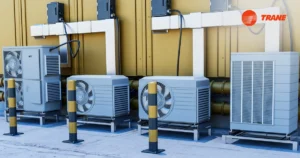Introduction: Why refrigerated containers matter today
Global supply chains are more fragile than ever. From extreme weather to sudden shifts in consumer demand, businesses face mounting pressure to protect perishable goods and temperature-sensitive products. Refrigerated containers have emerged as one of the most reliable tools in this effort. By combining mobility, temperature stability, and scalability, they give industries the flexibility to adapt quickly while safeguarding both products and profits.
What are refrigerated containers, and why are they important?
Refrigerated containers, often referred to as “reefers,” are portable units designed to maintain precise temperatures during storage or transportation. Unlike fixed cold rooms, these containers provide:
- Flexibility: Units can be relocated or scaled to match demand.
- Control: Digital systems allow monitoring of exact conditions.
- Versatility: Suitable for land, sea, or site-based applications.
In today’s volatile business environment, their importance lies in their adaptability — they allow businesses to protect goods wherever and whenever cooling is required.
Which industries depend most on refrigerated containers?
The applications cut across sectors, but the industries with the greatest reliance include:
- Food and Beverage: From fresh produce to frozen meals, containers ensure consistent quality during seasonal peaks and long-distance transport.
- Pharmaceuticals: Vaccine distribution and sensitive chemical storage demand precise, uninterrupted cooling.
- Logistics and Retail: Distribution hubs and retail warehouses use containers as overflow storage during busy periods.
- Fisheries and Agriculture: Export markets require stable conditions to preserve product value across long supply chains.
- Events: Large functions with catering needs depend on mobile cold storage to keep food safe and fresh.
By serving such diverse industries, refrigerated containers highlight their versatility as a backbone of modern commerce.
How do refrigerated containers address supply chain disruptions?
Supply chains today face multiple disruptions — from climate extremes to geopolitical tensions. Containers help mitigate these risks by:
- Creating buffer capacity when demand outpaces warehouse availability.
- Supporting decentralised storage, allowing companies to position inventory closer to customers.
- Reducing spoilage risk during delays in shipping or border clearance.
- Enabling resilience by acting as mobile backup during power outages or facility failures.
This flexibility ensures that businesses maintain continuity even under unpredictable conditions.
What technology makes modern refrigerated containers reliable?
Advancements in technology have made containers smarter and more efficient:
- Digital monitoring systems provide real-time data on temperature and humidity.
- Remote alerts notify operators of deviations, allowing rapid intervention.
- Eco-friendly refrigerants reduce environmental impact while meeting global regulations.
- Energy-efficient compressors lower operating costs without compromising reliability.
With these features, refrigerated containers are not just temporary fixes but strategic assets for businesses focused on both efficiency and sustainability.
Why choose containers over permanent cold storage facilities?
Permanent infrastructure remains vital for many industries, but containers offer unique advantages:
- Speed of deployment: Containers can be delivered and operational within hours.
- Lower upfront investment: Businesses avoid the high capital costs of new buildings.
- Flexibility: Units can be scaled up or down depending on seasonal demand.
- Mobility: Containers can move between sites or regions as business needs evolve.
For companies balancing cost control with agility, refrigerated containers provide a competitive edge.
How do refrigerated containers support sustainability goals?
Sustainability is increasingly shaping business decisions. Containers contribute by:
- Reducing waste: Protecting products from spoilage prevents losses and cuts resource use.
- Improving efficiency: Energy-optimised systems consume less power.
- Supporting circular logistics: Containers can be redeployed across sites, maximising asset use.
By aligning with both operational and environmental priorities, containers allow businesses to grow responsibly.
Why partner with Trane for refrigerated container solutions?
Not all solutions are equal. Trane differentiates itself by offering:
- Engineering expertise: Decades of experience in precision cooling.
- Global presence with local support: Rapid response wherever operations are based.
- Customised configurations: Containers designed to meet industry-specific requirements.
- 24/7 monitoring and service: Ensuring reliability when it matters most.
- Sustainability focus: Commitment to eco-friendly refrigerants and efficient designs.
This combination provides businesses with confidence that their storage challenges will be met reliably and responsibly.
What is the business case for investing in refrigerated containers?
For decision-makers, the value extends beyond operational convenience:
- Protects brand reputation by ensuring consistent product quality.
- Supports market expansion by enabling exports and long-distance logistics.
- Improves financial performance by cutting spoilage and downtime costs.
- Delivers agility to respond to new opportunities or disruptions.
In short, refrigerated containers are more than cooling units — they are strategic enablers of resilience and growth.
Conclusion: Flexible protection with cold storage rental
As supply chains face mounting pressures, flexibility and reliability have become the cornerstones of success. Refrigerated containers provide both, offering businesses rapid deployment, mobility, and temperature stability across industries. By partnering with Trane, organisations gain access to world-class expertise, efficient technology, and tailored support. For businesses seeking even greater flexibility, Trane also provides scalable cold storage rental solutions, ensuring product safety and operational continuity in any environment.




